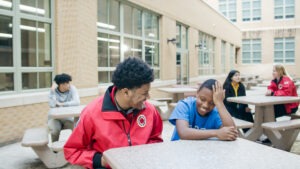Focus on student mental health & filling the gaps

Before the pandemic, mental health needs for children, adolescents, and families were considerable and, in many cases, went unmet due to the lack of adequate resources and infrastructure. Unfortunately, the pandemic intensified the mental health needs of children. In a recent survey focusing on children’s mental health during the COVID-19 pandemic, 72% of parents stated that they have witnessed a decline in their child’s emotional well-being since the onset of the pandemic. Dr. Ken Duckworth, chief medical officer of the National Alliance on Mental Illness said, “Demand was beating supply before the pandemic, before the racial trauma, before the election, and before the winter, now what you have is demand crushing supply.” In Detroit, this is truer than ever. The lifetime prevalence of anxiety among high school students in the U.S. is approximately 31%; however, locally, 46% of students reported mild or moderate symptoms of anxiety and an additional 10% reported severe symptoms.
Schools are uniquely suited to assist youth with mental health concerns. Students spend a substantial amount of time within school buildings, providing a greater chance for the identification of mental health concerns and referral to treatment. However, despite the growing mental health needs of students, Michigan has a shortage of health professionals working in schools. The state falls short of recommended ratios of health professionals to students employed in schools and, in most cases, falls far behind the national average.
RECOMMENDED AND ACTUAL RATIOS OF HEALTH PROFESSIONALS TO STUDENTS IN MI SCHOOLS
| RECOMMENDED | US | MICHIGAN | |
| SCHOOL COUNSELORS | 1 : 250 | 1 : 464 | 1 : 744 |
| SCHOOL SOCIAL WORKERS | 1 : 250 | 1 : 2,106 | 1 : 1,051 |
| SCHOOL PSYCHOLOGISTS | 1 : 500 | 1 : 1,211 | 1 : 1,521 |
| SCHOOL NURSES | 1 : 750 | 1 : 936 | 1 : 4,199 |
DATA SOURCE National Association of School Psychologists, Education Trust-Midwest, American Civil Liberties Union
“Unfortunately, federal and state education funding does not take into account that our schools and their employees must overcome the daily socio-emotional challenges our children face every day. This means we cannot simply focus on teaching and learning.” said Detroit Schools Superintendent Nikolai Vitti in a recent Youth Policy Lab article.
Despite monumental effort on the part of school district and city leaders, numerous challenges remain in Detroit. We know with proper training, City Year AmeriCorps members can help to fill this gap. With enhanced training, corps members are equipped to identify and provide initial support to a student who may be developing a mental health problem or experiencing a crisis and collaborate with school staff when additional support is needed.
Thanks to funding provided by The Children’s Foundation in 2021, City Year Detroit was able to incorporate 20 additional hours of SEL/mental health-focused training. The training enhancements include a new partnership with TRAILS (Transforming Research into Action to Improve the Lives of Students), which builds on an existing program that DPSCD teachers participate in each year. The program aims to bring effective mental health care to students with depression and anxiety throughout Michigan. This year of learning is helping us to understand the landscape and identify opportunities for closer collaboration with our partner teachers and principals.
“This is a fantastic opportunity to support mental health services in schools. We know that more and more students are struggling with depression and anxiety because of the aftereffects of the pandemic. We are excited that we can incorporate the TRAILS program with our AmeriCorps members training curriculum,” said Steven Bowmen, City Year Detroit learning and development director.
Early results show that 73% of our AmeriCorps members responded favorably to the survey question: I feel prepared to serve in my role at City Year. This number is eight percentage points higher than the City Year network average. 90% of our AmeriCorps members responded favorably that mastering Social and Emotional Learning (SEL) concepts to support students is important to their service. This number is three percentage points higher than the City Year network average.
Due to the critical effects Detroit communities are experiencing at this stage in the pandemic, we believe that this training and support for our AmeriCorps members is necessary as we look ahead to the next school year. We will continue to work with the district to assess the needs of students and how City Year can help fill those gaps in the schoolhouse.
If you would like to support our SEL training or find out how you can support City Year Detroit, contact ggreen2@cityyear.org.
Related stories
My name is Roz Komisar Blanck and I am a relatively new board member. I heard about City Year from...
Read more about Meet City Year Detroit Board Member Roz BlanckCity Year Detroit AmeriCorps members serve as Student Success Coaches from the morning bell to the end of the day...
Read more about Meet City Year Detroit's Team Cody & Team Law!City Year Detroit’s school team at Cody High School nominated Elizabeth Toye for our School Partner Spotlight because of...
Read more about City Year Detroit School Partner Spotlight – Elizabeth ToyeCity Year Detroit’s school team at Marion Law Academy nominated Nkosi Shorter for our School Partner Spotlight, in part,...
Read more about City Year Detroit School Partner Spotlight - Nkosi Shorter















